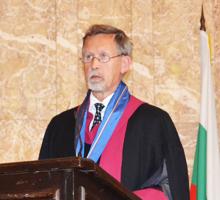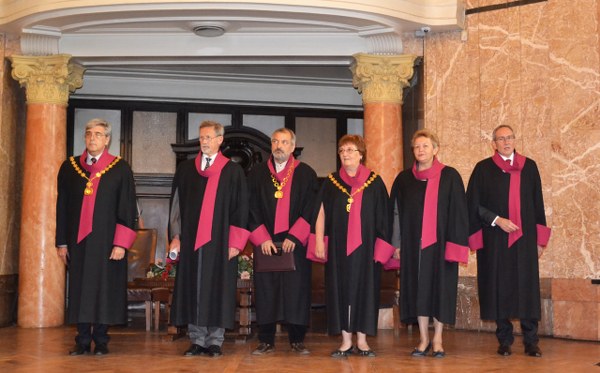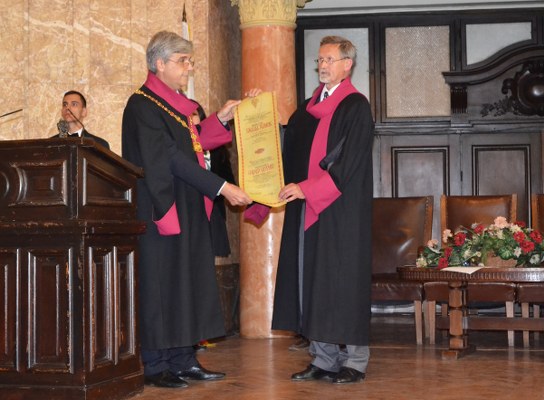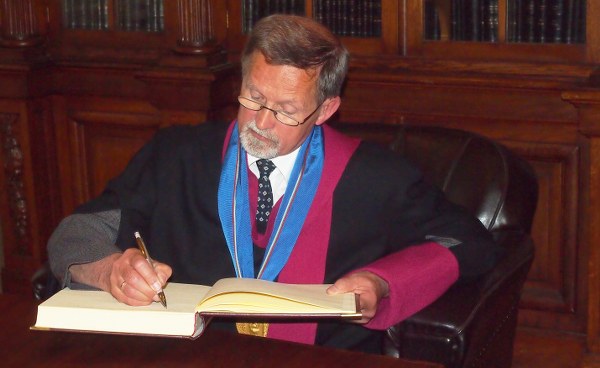
Professor Harald Hepner
At Aula magna of Sofia University “St Kliment Ohridski” a solemn ceremony was held to confer a Doctor honoris causa degree to Professor Harald Hepner from Carl Franz University (Graz, Austria).
The proposal for the conferment of the honorary title by the oldest and most prestigious high academic institution in this country came from the Faculty of History and it is a recognition of his overall work as a scientist and his contributions to the development of Bulgarian historical science in the past twenty five years.
The ceremony was held before the solemn Masters’ and Bachelors’ graduation of the graduates of the Faculty of History for the year of 2014. The event was attended by His Excellency Roland Hauser, ambassador of Austria to this country, Professor Dr. Roumen Pankov, Deputy Rector of Research and Project Activities, Associate Professor Dr. Milena Stefanova, Deputy Rector for Educational Activities, Professor Dr Plamen Mitev, Dean of the Faculty of History, faculty, students and guests.
The solemn ceremony was opened by Professor Dr. Plamen Mitev, Dean of the Faculty of History, who presented briefly the curriculum vitae of the distinguished guest. Professor Hepner was born in Graz, Austria, in 1950. He received his degree in history and Russian philology at the University of Graz. His whole scientific and academic career goes at Graz University. He is one of the most outstanding Austrian and European scholars of the history of the Balkans and South Eastern Europe of the XVI – XIX c. He is the author of more than 200 publications and has participated in numerous scientific commissions and societies. Recently he has chaired the Austrian section of XVIIIth century research.
Professor Hepner is one of those Austrian scholars who have done their best for the promotion of Austro-Bulgarian cooperation in the 90ies of the XXieth century. Several specialized publications were published under his competent editorship, which include articles of Austrian, Bulgarian and other European scholars, providing a fresh view of the history of the Balkans in the XVIII – XIX centuries.
Professor Hepner has been actively supporting Bulgarian scholars doing research work on the Austro-Bulgarian and the Austro-Balkan relations and in that respect he followed his conviction that the representatives of the so-called “small national historical schools” can generate research of very high caliber. Due to his support, more than 40 research workers, PhD and MA students had the opportunity to work at the University of Graz, and other academic and state institutions in Austria.
Professor Harald Hepner has included in his research projects scholars from Sofia University and has participated in project initiatives of the oldest academic high school in this country. His joint publications, coming as a result of those projects, come to about 15.
The most recent Doctor honoris causa of Sofia University is the founder of the History of South Eastern Europe MA programme that includes eight high academic institutions from Central and Eastern Europe, including Sofia University.
After the conferment of the Doctor honoris causa degree by Professor Dr. Roumen Pankov, Deputy Rector of Sofia University, Professor Hepner addressed the audience and thanked for the bestowed honour.
The topic of Professor Hepner’s academic lecture was “The Balkans on the Eve of the Modern Age Process”.
“If we are to look at the contemporary development of Europe we shall certainly notice a number of problems of different origin. In my opinion, some of these problems have their roots far beyond the recent decades. There is no doubt that we live in times of radical changes, yet at the same time we may fail to explain the exact nature of the transformation and how long it may take place. In that case it will hardly be possible to predict our future and, in fact, we shall be left only with the hope to survive in comparatively reasonable circumstances,” Professor Hepner stated at the very beginning of his talk.
He expressed his conviction that the people who had lived in the XVIIIth and the beginning of the XIX c. had perceived their life horizon in a similar way: they did view the fundamental changes but were unable to predict the results that came from them. Professor Hepner made a brief analysis of the perspectives related to the above period on and around the Balkans.
He raised the issue as to how the contemporaries of those times could have understood that everything around them had been going through a fundamental change. Briefly, he addressed the new challenges which had been faced by the population of the Balkans: what are the results of the military conflicts, the impact of the Enlightenment, the changes that came as a result of the industrial development, and the concept of secular education.
Professor Hepner stated that the process of modernization of the Balkans was going very dynamically and not at the same speed in the different geographical regions.
“The bigger part of the so-called “Balkan community” of those times could not establish its vision of the coming challenges and that was why the Balkan peoples could not envision their own destiny. The latter was not simply linked to the creation of a national state but it also presupposed the consummation of the “hard to digest” menu of the Western way of life, the latter comparatively quickly penetrating through the Balkans. That transition to modernization needed more time in comparison with what it had in the region. A far more numerous educated elite was also lacking.”
At the end of his lecture Professor Hepner mentioned that similarly to the people who lived in the XVIIIth c. and the beginning of the XIXth c., we could not predict our future. “Of course, the starting points are incomparable, but the problems seem to be the same. The only difference is that we keep the memory of the preceding situation but whether it will turn useful when we turn our view to the decades ahead, it is still to be validated.”






